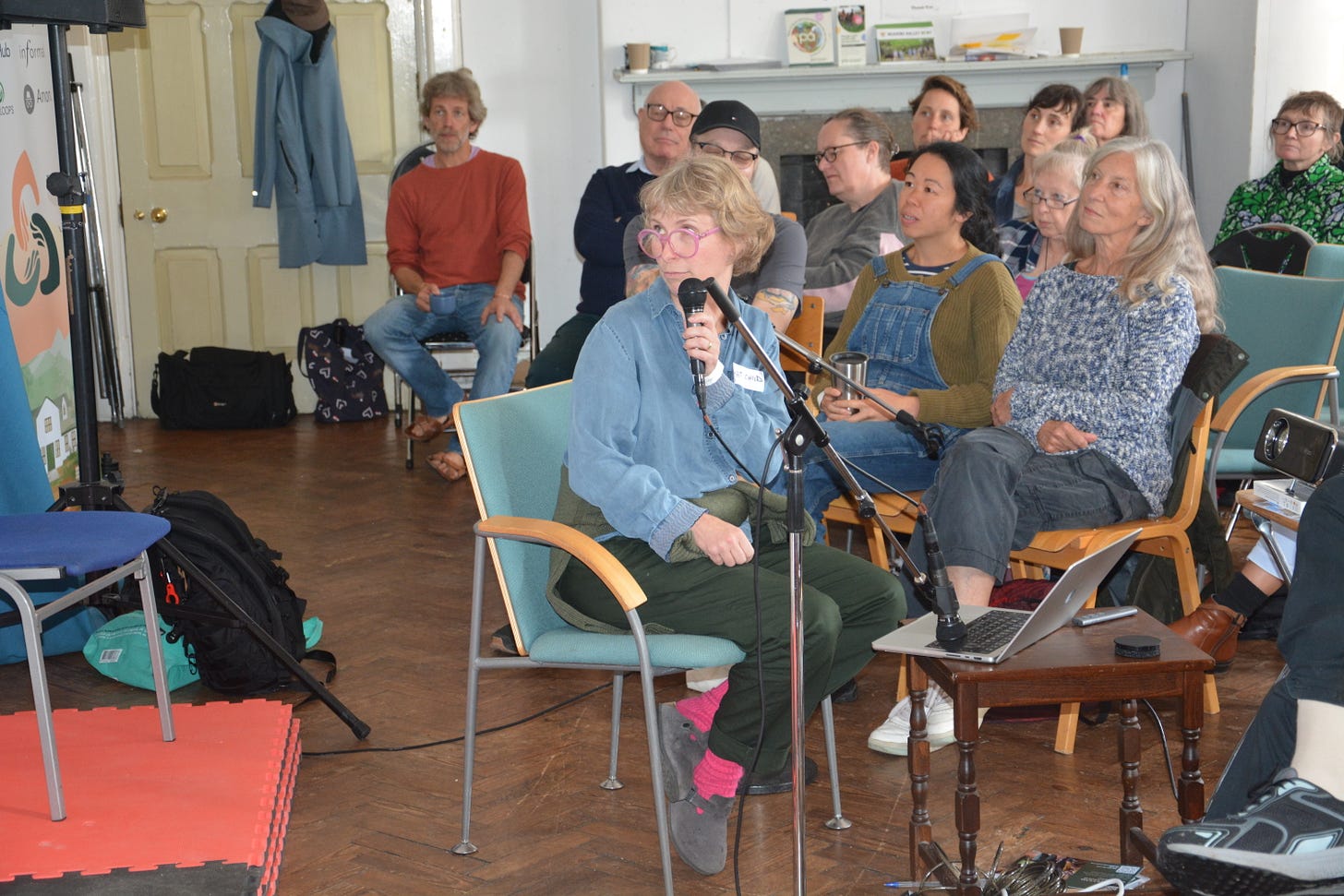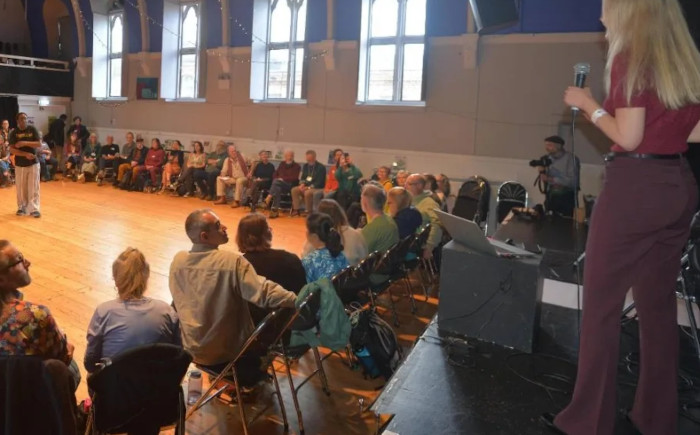A brief review of the festival by Katja Durrani of Bristol Commons
This was the second time that Stroud Commons put on a Festival of Commoning, exactly a year after the first, and it has grown in size since.
It featured two tracks in venues close to each other. Below I recount my personal experience from these two days. I decided to start with a panel session with Sue Bell, Matthew Slater and Dil Green on Collaborative Finance (CoFi).
Money and governance
With money as a kind of operating system of everyday life, there is always a feeling that there is not enough — and often at the same time, that there is not enough work. There are technical reasons for that, such as the private banks creating money for profit, not for the benefit of the people.
In the past, people helped each other out in various ways, using vehicles such as mutual insurance groups or building societies, where people took turns building houses for each other. Today they mostly exist only in name.
A Local Exchange Trading System (LETS) keeps score of what people give and receive — which is effectively all that money is. In the 90s these schemes were very popular, but many gradually faded in the following decades.
Asked for personal experience with local currencies, a lively discussion started in the small room.
This session already encapsulated themes that would recur across the rest of the festival:
- What really matters most is the people:
- Rules without a social structure won’t work.
- People who get on will be able to evolve their rules.
- Views of what happens and what it means can vary a lot and we still need to get along.
- Sometimes egos get in the way.
- As Dil said, “the price of commoning is local politics”.
- With finance especially, there is disbelief that things could be done in a different way, because of fear and lived experience.
- If you want to get people on board, it is important to show there are tangible benefits compared to the status quo.
Next, I went to listen to Dil speak about governance in the Lansdown Hall. He talked for about 10 minutes each time (introducing specific ideas), and then took a break in which people could ask questions and share their views. This format worked really well.
“We are all experts in commoning”, he said. “A respectful conversation at a bus stop is already a form of commoning — if they are not willing to pass the ball back, there will just be two people staring in opposite directions.” And, “commons is the basis of us surviving. Even in the most dismal conditions, in circumstances of forced labour, enslaved people in 19th century South America created music.”
From the audience came comments on how important play and also practice is.
We discussed the need for institutionalising commons. Could they not just naturally arise? Were institutions not things taking on a life of their own, ultimately not being there for us anymore, but existing only to serve the institutions themselves?
How can we have institutions without them having us?
“We build institutions that live longer than us” , said somebody in the audience. “Institutions don’t die enough.”
Dil’s reply was: “Look outside. Look at the history of the commons: enclosure. Well-governed commons need a monitoring function. Commoning is under attack everywhere. “
“We might not even need the governance till somebody comes and says, ‘You’ve built something nice here, here’s some money’”.

Paradoxes of the Commons
Institutionalising the anti-institutional was one of a number of paradoxes.
Another one: Where are the “common people” in the commons when it was once the domain of peasants and then the working class?
I literally heard somebody say not long ago, “the commons is not for ordinary people”. They weren’t being derogatory. I know that for a fact; it was just an observation.
It was a question that cropped up in a panel debate on Friday night. And it seems clear: Mostly middle class people, especially the retired and well-off, are the ones who have time and money to engage with this kind of activism.
Claire Mellier had a very practical answer on how to change the demographics (in reply to the question “how do we stop being do-gooders and navel gazers?”): “Pay for time, pay for childcare, pay for transport.” That surely could be a start?
Another interesting paradox is that formal commons can diminish or cease to exist because they are successful. In a LETS money commons, if people start to know each other well, they might stop the formal accounting and just do each other favours.
If not now, when?
There was at times a sentiment of exasperation, of urgency and impatience, recognising that this is a time of great potential. That is how I perceived it. Let us just get on with it! But how?
There were many ‘how’ questions, there always are. Because this is all new. We cannot just recover what was lost, we have to re-invite and reinvent it.
Perhaps we just have to trust that if we know where we are going, or at least what we want to move away from, it will eventually work out.
One of the talks I missed was the presentation of the ‘Commons Lab’ that Michel Rauchs is setting up with Chik Shimasaki. This will be an interesting initiative to fund and support experimental projects.
I enjoyed listening to Chris Cook, and later to Marcus Saul, from Island Power. Their histories, especially that of Chris Cook, are fascinating and so are their ideas for specific legal agreements, and the research they do, to move towards community-owned energy grids that deliver higher energy efficiency, resilience, and are more affordable.
Hearing Sara Arnold and Kirsten Scott talk about Fashion was great, too, and Andy Goldring about Permaculture and Commons.
I would have liked to go to the Liberating Structures Workshop, but it was too full. I also missed the talks about Hasting Commons and the Network of Stroud Hubs, but I will watch the recordings.

Politics and the Commons
So, I will now jump to the end of the festival, which featured two quite high-profile figures, Jem Bendell, author of the 2018 Deep Adaptation paper and the book Breaking Together, and Carne Ross, former British diplomat turned anarchist.
Jem Bendell’s speech focusing on economic dispossession and political action provoked some pushback on the language he used, among others from Carne Ross. This should not distract though from what was, in my view anyway, a valid contribution. Whatever you call it, multinationals buying up land in this or other countries is wrong, and so are Israel’s actions in Gaza.
For both Jem Bendell and Carne Ross, having been so much in the spotlight can’t have been easy. I cannot even imagine what that must be like. Carne Ross’s story, in the form of a documentary filmed in 2015, can be seen here. His conversation with Sue and Chik and the following Q & A session were really interesting, and Rojava’s story carries some paradoxes within it, too.
I agree that external, political change can only happen when we transform our inner selves.
This involves above all being out in the world and talk to people, try to understand their reasoning and convey yours.
For me this can be quite hard, I have to say, and I think it will be for others, too. But by now I believe this is the way to go, if we want to have a say in our future. We must engage with politics on the local level. We must have uncomfortable discussions with people we might not like. We must create a pluralistic society again.
I sometimes think that young people already do a lot of commoning, in our family lives and by helping each other out in their friendship groups. We miss them at events like this, but what if they are already on board? What if our task is to enable them to not potentially get sucked into a life of debt, brutal competition, senseless activity and dull jobs?
With this, I thank everyone who has enabled this conference, especially Chik and Sue, the volunteers, the brilliant speakers and Julian Jones for the beautiful pictures.
Matthew Slater shares another perspective on the Festival of Commoning
Congrats to all involved at the Festival of Commoning for a milestone event, which is putting commons discourse on the UK map.
The two-day event spanned two venues, sold 150 tickets to new faces and old. Most people were local to Stroud which is already a hotbed of alternatives, but several people came a long way too. I spoke to people who had come especially from California, Ireland, Slovenia, and many from London. The content covered commoning in various fields, with an emphasis on finance, as well as more strategic discussion such as how to include the working classes.
I was pleased at how many speakers did a good job of including their audiences rather than hogging attention.
The depth of intellect and energy reminded me of Transition Towns around 2006. Transition Towns was a comparatively large movement which had scores of chapters in the UK and more abroad. It thrived for about a decade and chalked up many achievements, including birthing the town pounds in the UK, with many many towns in Europe following. But at some point it stopped growing and interest stalled, almost as if it had reached a natural limit. Supporters of commoning should try to learn from this, because the seeds of decline, or the natural limits of the movement, are likely defined very early on, and the movements have a lot in common.
- Started in a radical town in the south west of England.
- Strong intellectual grounding and middle class participation.
- Broad theme.
- Acceptance of the consequences of Western civilisation not being sustainable.
There has been some academic study of the movement, and various reasons are put forward for it failing to appeal to the mainstream:
- Rooted in permaculture, easily perceived as ‘hippy’.
- Maybe it just became a bit staid, despite founder Rob Hopkins’ constant innovation. Failed to cross class and race boundaries.
- Its core messaging about peak oil and the need to focus on food production was actually rather limited, so the market became saturated rather quickly.
- The core proposition, of peak oil, was supported by high oil prices, but when prices came back down, it seemed wrong.
That’s why the final speech by Jem Bendell was especially pertinent. It drew a comparison between the gradual disenfranchisement of British, European and American working classes, with the genocidal disenfranchisement of Gaza. He pointed out that both were financed by transnational capital, and reminded the conference that their small and local successes will never add up without parallel political agitation. The message was warmly received, although most of the dialogue that followed was sidetracked by debate about whether Bendell should have avoided words to which the ‘far right’ have ascribed hateful meanings.
I agree that a special effort must be made to win political battles, even if the war is lost already. This is a special challenge because the movement is comprised largely of practical types, who are frustrated, or in many cases gave up on politics long ago. To them, putting scarce resources into lobbying politicians detracts and might yield abstract gains, but at the cost of tangible achievements which feel more rewarding.


Leave a Reply